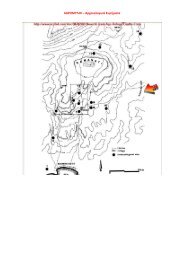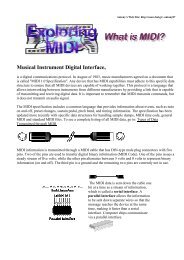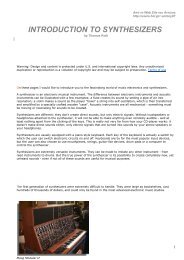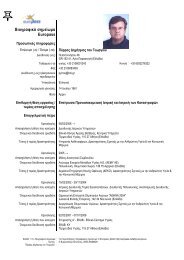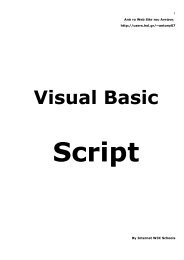Recording Handbook - Hol.gr
Recording Handbook - Hol.gr
Recording Handbook - Hol.gr
You also want an ePaper? Increase the reach of your titles
YUMPU automatically turns print PDFs into web optimized ePapers that Google loves.
It's generally a bad idea to have a band member's significant other (boyfriend, girlfriend,<br />
spouse, dog, parakeet) as a producer unless they're a professional.<br />
2.6) Where can we get the money?<br />
Rich relatives. :) Seriously, it's handy to have someone to borrow from if you're not making money<br />
gigging. Make sure you pay them back as soon as you can. Save some.<br />
SECTION III: BEFORE YOU GO<br />
3.1) What songs should we record?<br />
Record your best songs. It's important to make a distinction between good live songs and good<br />
recorded songs, though; some of the most powerful live music doesn't translate well to a CD<br />
without the audience to feed off of.<br />
It's better to record fewer, better songs than to record more, crappier songs. You may not want to<br />
admit it, but we ALL write crappy songs (some more than others).<br />
Record songs that are fun to play. You're probably gonna end up playing them a lot.<br />
Record a variety of songs. If you've got some hip-hop, some metal, some pop, and some country<br />
songs, maybe pick the best songs of each type. Critics are very unfriendly to bands whose recorded<br />
music "all sounds the same."<br />
3.2) Should we record covers?<br />
Probably not. Two definite no-no's are to record covers that are still under copyright (you may do a<br />
better version of "Panama" than Van Halen themselves, but that doesn't make it legal) or to record<br />
songs that everyone and their sister has already covered ("Mustang Sally," "Little Wing," etc.)<br />
3.3) What gear should we take?<br />
As little as you can get away with and still get your sound.<br />
For guitarists, I'd suggest an amp (head and cab), a guitar, your basic effects, and enough cables to<br />
put everything together. It's been my experience that studios have spares for most stuff that can<br />
fail. They probably also have better effects than your Crap-o-Tron flanger, too. Bring spare tubes,<br />
though.<br />
Bass, for a demo project, is usually recorded directly into the board, so there's no need to bring an<br />
amp.<br />
Drums can sometimes be provided by the studio, unless you're so totally in love with your kit that<br />
you can't play anything else.<br />
Singers should bring a big bottle of whisky. (Just kidding.)<br />
3.4) How should we prepare?<br />
Let me preface this by again reminding the reader that this is based on my experience, and that<br />
every band has its own style and dynamic. This worked for us; it may not work for you.<br />
The most important preparation to do is of the music. You're paying for studio time; it's cheaper to<br />
make sure everything's ready beforehand. Practice time is free, or close to it. Use it. Practice the<br />
songs over and over, until everyone could play their part backwards and in their sleep.<br />
One thing that worked for us was deconstruction. We'd play a song a couple of times, then break it<br />
down into parts. First, just drums and rhythm guitar, then drums and bass, then rhythm guitar and<br />
142<br />
142





